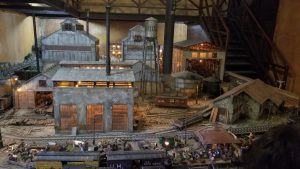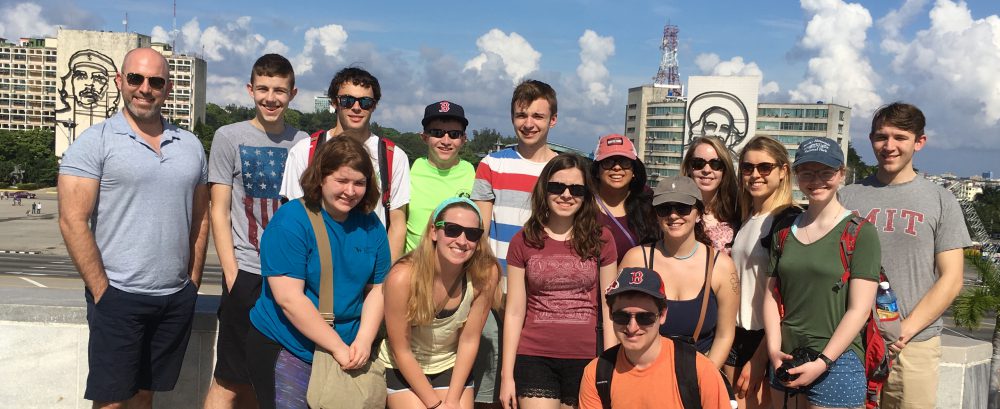Ah, finally, it was Saturday. We were originally supposed to go to the Grand Theater today. As can be anticipated in Cuba, things didn’t go according to plan. The weather forced us to hold the baseball game with the Little Leaguers until this Saturday. I was really pumped; I love baseball and I love playing baseball with little kids even more. I had brought a baseball bat, some baseballs, and baseball cards to give out to them. Unfortunately, to my dismay, the field was a mess from the rain and the coach decided to call of practice, meaning we couldn’t play with the kids. I was really looking forward to playing with them but even though things didn’t turn out as planned, we still had a busy enjoyable day. During the day, we viewed and learned about many aspects of Cuban culture that are preserved including Hemingway’s work and his home, baseball, rum, and the passionate, inviting personality of the Cuban people.
Even though the weekly baseball game was cancelled, we still visited Hemingway’s home right near the field. Talk about preserved, everything was left the way Hemingway left it, from the numerous amounts of drinks on the tables to all the books he had and even the bathroom which remained untouched. Cubans adored Hemingway and his work, and in their eyes, there would be no better way to honor him than to keep his house and possessions completely intact just the way he left them. It’s truly a sign of respect that the Cubans had for Hemingway. To me, it was great to see this. I had read many of Hemingway’s works and wrote many essays on him. I knew he was a great writer of high caliber but to see how well-respected he is in other countries proves to me how great a man and a writer he was.

A quick view of Hemingway’s bedroom.

Hemingway’s desk, where he wrote many of his famed writings.
After touring the house and the outskirts (along with his large pool and massive boat), we got a pleasant surprise from the Little League coach and his star player who was of Chinese and Cuban descent. Going through the training regiment of the Little Leaguers, the coach explained that he holds practice with his team every day, getting them ready for any challenging teams they must face, with the hope of a career in baseball in the future. Quite successful in his endeavors, as many of the players he coached and trained went on to play for Cuban national teams like the Industriales, the baseball team originating in Havana. He told us that his deep love and passion for baseball is what motivates him to keep coaching, even as he gets older. Soon after, the pair graciously accepted an array of donations from us including baseball cards, hats, balls, banners, and the bat. All donations go to the Little League team, which is a great feeling. Even though we couldn’t play with the team, we donated to the cause, which is an equally satisfying feeling. By coaching new up-and-coming players in the sport of baseball, Cuba preserves its long-lasting sport. Bringing kids through the system until they transition to the national level helps keep the sport alive and entertaining. Even as the country continues to grow and advance, baseball will remain as a dying passion of the Cubans. As an avid sports fan, I love to see this passion for a sport. Being from Boston, pride runs deep for Boston sports because of their successful, accomplished history. The same can be said for Cuban pride of baseball, it runs deep and that is something that can never be taken away and will always hold strong as long as baseball remains.

Hemingway’s 38-foot fishing boat, the Pilar.

The Industriales, Havana’s home baseball team lining up to take on Las Tunas in a playoff game.
As the day progressed, we continued to move, now heading to the rum museum. One of the most anticipated parts of our trip and now I know why. It was a blast; even before the tour started, we got to see sugar cane getting grinded to get the juice out of it and be used in drinks. We even got to be on the job and crank the cane ourselves. Our tour began shortly after: we had a nice, smart tour guide who showed us through the museum, and elaborated about the fermentation, refinement, and preservation process. Rum, of course, must be preserved, but in Cuba, it is preserved in a cultural sense as well. Rum was around in Cuba before the days of the U.S prohibition and has remained up through today with Havana Club, “el Ron de Cuba”, one of the best, if not the best brand of rum in Cuba. To the Cubans, rum is a cherished drink that has stuck through most of their history and is still around today. It is still served today in common drinks like rum and coke in restaurants and bars everywhere. For me, I see rum as another cornerstone of maintaining Cuban culture. Obviously, there are other types of drinks without rum, but the rum is so well-known that even the glasses at restaurants are marked with the Havana Club logo. That just shows how much of a prevailing force rum has in Cuban culture.

A prototype of what the rum museum used to look like.

The bar of the rum museum, where a variety of rums are served.
To end the day, we went to a Cuban market, the Almacenas de San Jose Arts Market. Filled with booths full of tacky souvenirs, fascinating ones like ceramic mugs and glasses, and even some art, this market had everything imaginable for markets. The market really embodied Cuban culture because of the products and the atmosphere. Back home, I’ve seen vendors try and drag people into their store but never like this. At every row, every step you take, they’re shouting offers to you, pulling you in, telling you to look. As their motto goes at the market, “Looking is free”. Not only do they do it but they are persistent too. If you wanted to Cuban personalities, look no further than the market. It’s a true embodiment of the relentless, passionate personality and character of the Cuban people. As long as the market remains, that personality will forever live on. This is truly important as a place is commonly described by its people and the people have so much passion and energy, they exude it and you can feel it talking to them. It helps make Cuba such a unique and special place. There is no other place like Cuba in the world. As time moves forward, Cuba will as well. Some things will stay, and some will go but the Cuban culture will never disappear, it will be forever preserved.
